Management Practices: Evolution Before and After Industrial Revolution
VerifiedAdded on 2022/12/28
|8
|2502
|23
Essay
AI Summary
This essay provides a comprehensive overview of the evolution of management practices, tracing their development from before the industrial revolution to the present day. It begins by outlining the significance of management practices in improving business efficiency and introduces key concepts and theories. The essay then delves into the pre-industrial era, discussing the emergence of scientific management theory, Taylor's principles, Henry Fayol's 14 principles, Weber's theory, and the contributions of Gilbreath, Emerson, and Munsterberg. The main body also covers the impact of the industrial revolution and the shift towards technology-driven practices, emphasizing changes in staff efficiency, organizational structure, and the rise of human relations theory. The post-industrial era is examined, highlighting the influence of technology, social activities, and the importance of employee engagement. Various management theories, including the neo-classical, system, Maslow's hierarchy, Hertzberg's two-factor theory, and contingency and Likert's holistic approaches, are explored. The essay emphasizes the importance of management theory in achieving organizational goals, enhancing leadership, and improving communication. The conclusion summarizes the key points, underscoring the evolution of management practices and their impact on organizational success.

Essay
1
1
Paraphrase This Document
Need a fresh take? Get an instant paraphrase of this document with our AI Paraphraser
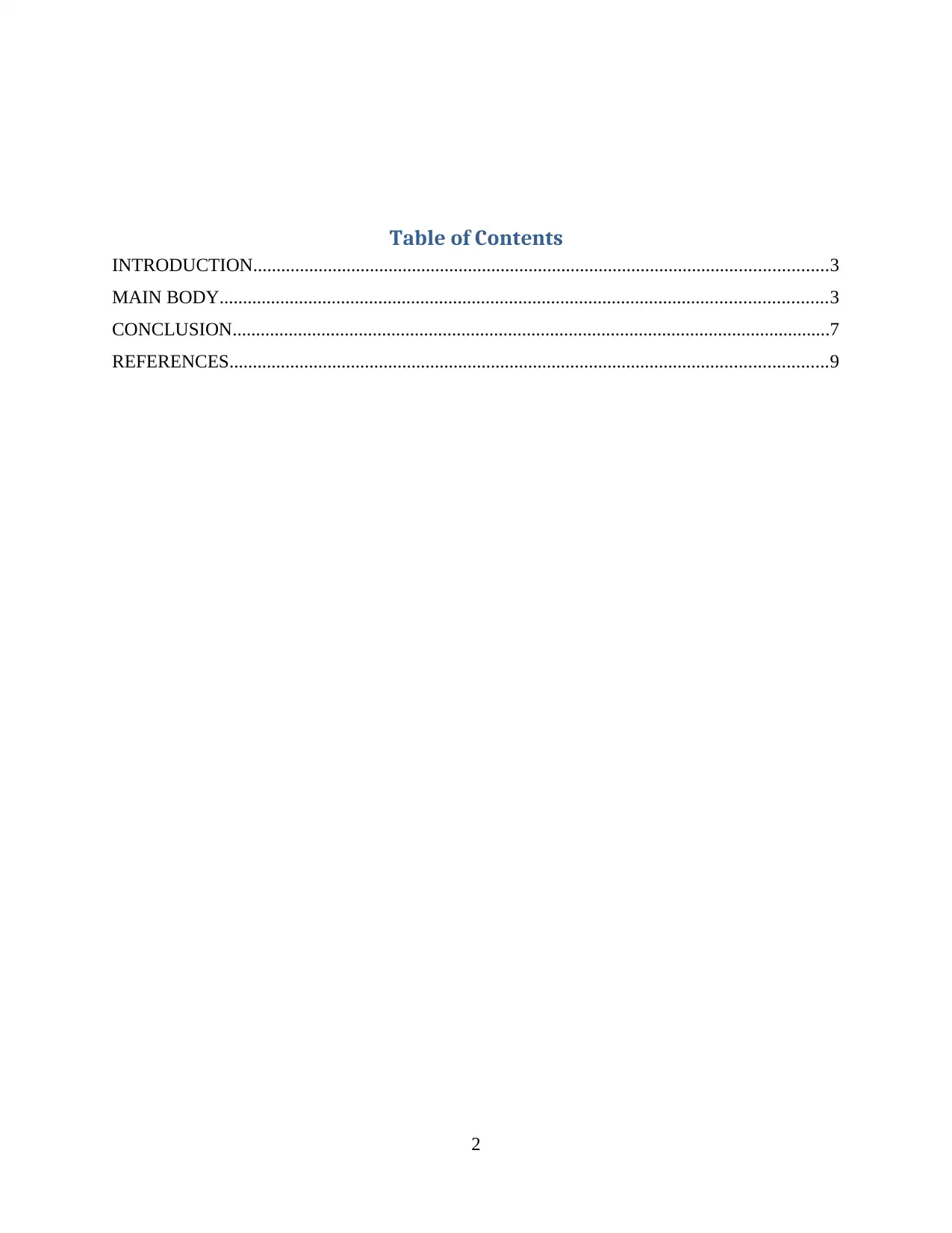
Table of Contents
INTRODUCTION...........................................................................................................................3
MAIN BODY..................................................................................................................................3
CONCLUSION................................................................................................................................7
REFERENCES................................................................................................................................9
2
INTRODUCTION...........................................................................................................................3
MAIN BODY..................................................................................................................................3
CONCLUSION................................................................................................................................7
REFERENCES................................................................................................................................9
2
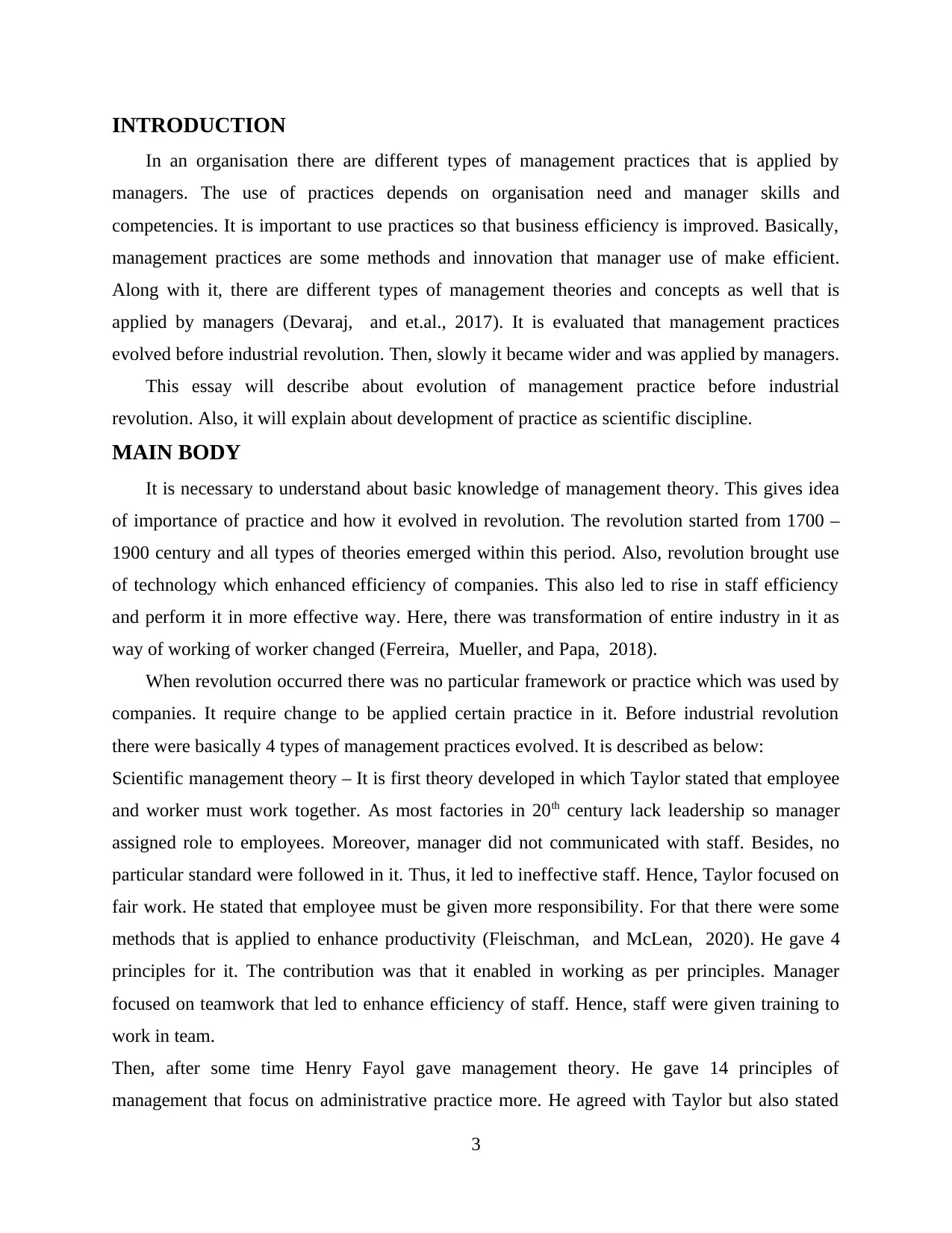
INTRODUCTION
In an organisation there are different types of management practices that is applied by
managers. The use of practices depends on organisation need and manager skills and
competencies. It is important to use practices so that business efficiency is improved. Basically,
management practices are some methods and innovation that manager use of make efficient.
Along with it, there are different types of management theories and concepts as well that is
applied by managers (Devaraj, and et.al., 2017). It is evaluated that management practices
evolved before industrial revolution. Then, slowly it became wider and was applied by managers.
This essay will describe about evolution of management practice before industrial
revolution. Also, it will explain about development of practice as scientific discipline.
MAIN BODY
It is necessary to understand about basic knowledge of management theory. This gives idea
of importance of practice and how it evolved in revolution. The revolution started from 1700 –
1900 century and all types of theories emerged within this period. Also, revolution brought use
of technology which enhanced efficiency of companies. This also led to rise in staff efficiency
and perform it in more effective way. Here, there was transformation of entire industry in it as
way of working of worker changed (Ferreira, Mueller, and Papa, 2018).
When revolution occurred there was no particular framework or practice which was used by
companies. It require change to be applied certain practice in it. Before industrial revolution
there were basically 4 types of management practices evolved. It is described as below:
Scientific management theory – It is first theory developed in which Taylor stated that employee
and worker must work together. As most factories in 20th century lack leadership so manager
assigned role to employees. Moreover, manager did not communicated with staff. Besides, no
particular standard were followed in it. Thus, it led to ineffective staff. Hence, Taylor focused on
fair work. He stated that employee must be given more responsibility. For that there were some
methods that is applied to enhance productivity (Fleischman, and McLean, 2020). He gave 4
principles for it. The contribution was that it enabled in working as per principles. Manager
focused on teamwork that led to enhance efficiency of staff. Hence, staff were given training to
work in team.
Then, after some time Henry Fayol gave management theory. He gave 14 principles of
management that focus on administrative practice more. He agreed with Taylor but also stated
3
In an organisation there are different types of management practices that is applied by
managers. The use of practices depends on organisation need and manager skills and
competencies. It is important to use practices so that business efficiency is improved. Basically,
management practices are some methods and innovation that manager use of make efficient.
Along with it, there are different types of management theories and concepts as well that is
applied by managers (Devaraj, and et.al., 2017). It is evaluated that management practices
evolved before industrial revolution. Then, slowly it became wider and was applied by managers.
This essay will describe about evolution of management practice before industrial
revolution. Also, it will explain about development of practice as scientific discipline.
MAIN BODY
It is necessary to understand about basic knowledge of management theory. This gives idea
of importance of practice and how it evolved in revolution. The revolution started from 1700 –
1900 century and all types of theories emerged within this period. Also, revolution brought use
of technology which enhanced efficiency of companies. This also led to rise in staff efficiency
and perform it in more effective way. Here, there was transformation of entire industry in it as
way of working of worker changed (Ferreira, Mueller, and Papa, 2018).
When revolution occurred there was no particular framework or practice which was used by
companies. It require change to be applied certain practice in it. Before industrial revolution
there were basically 4 types of management practices evolved. It is described as below:
Scientific management theory – It is first theory developed in which Taylor stated that employee
and worker must work together. As most factories in 20th century lack leadership so manager
assigned role to employees. Moreover, manager did not communicated with staff. Besides, no
particular standard were followed in it. Thus, it led to ineffective staff. Hence, Taylor focused on
fair work. He stated that employee must be given more responsibility. For that there were some
methods that is applied to enhance productivity (Fleischman, and McLean, 2020). He gave 4
principles for it. The contribution was that it enabled in working as per principles. Manager
focused on teamwork that led to enhance efficiency of staff. Hence, staff were given training to
work in team.
Then, after some time Henry Fayol gave management theory. He gave 14 principles of
management that focus on administrative practice more. He agreed with Taylor but also stated
3
⊘ This is a preview!⊘
Do you want full access?
Subscribe today to unlock all pages.

Trusted by 1+ million students worldwide
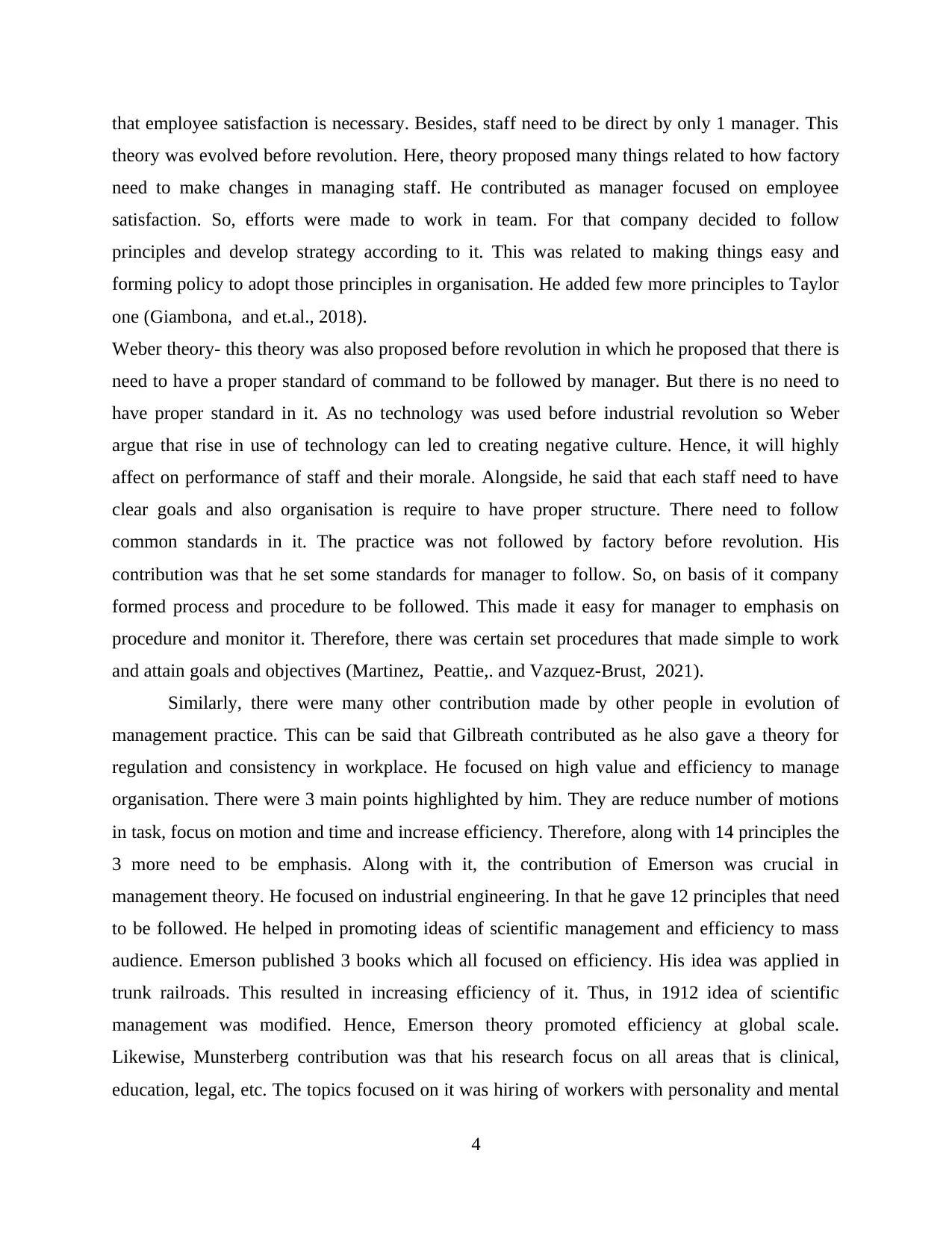
that employee satisfaction is necessary. Besides, staff need to be direct by only 1 manager. This
theory was evolved before revolution. Here, theory proposed many things related to how factory
need to make changes in managing staff. He contributed as manager focused on employee
satisfaction. So, efforts were made to work in team. For that company decided to follow
principles and develop strategy according to it. This was related to making things easy and
forming policy to adopt those principles in organisation. He added few more principles to Taylor
one (Giambona, and et.al., 2018).
Weber theory- this theory was also proposed before revolution in which he proposed that there is
need to have a proper standard of command to be followed by manager. But there is no need to
have proper standard in it. As no technology was used before industrial revolution so Weber
argue that rise in use of technology can led to creating negative culture. Hence, it will highly
affect on performance of staff and their morale. Alongside, he said that each staff need to have
clear goals and also organisation is require to have proper structure. There need to follow
common standards in it. The practice was not followed by factory before revolution. His
contribution was that he set some standards for manager to follow. So, on basis of it company
formed process and procedure to be followed. This made it easy for manager to emphasis on
procedure and monitor it. Therefore, there was certain set procedures that made simple to work
and attain goals and objectives (Martinez, Peattie,. and Vazquez-Brust, 2021).
Similarly, there were many other contribution made by other people in evolution of
management practice. This can be said that Gilbreath contributed as he also gave a theory for
regulation and consistency in workplace. He focused on high value and efficiency to manage
organisation. There were 3 main points highlighted by him. They are reduce number of motions
in task, focus on motion and time and increase efficiency. Therefore, along with 14 principles the
3 more need to be emphasis. Along with it, the contribution of Emerson was crucial in
management theory. He focused on industrial engineering. In that he gave 12 principles that need
to be followed. He helped in promoting ideas of scientific management and efficiency to mass
audience. Emerson published 3 books which all focused on efficiency. His idea was applied in
trunk railroads. This resulted in increasing efficiency of it. Thus, in 1912 idea of scientific
management was modified. Hence, Emerson theory promoted efficiency at global scale.
Likewise, Munsterberg contribution was that his research focus on all areas that is clinical,
education, legal, etc. The topics focused on it was hiring of workers with personality and mental
4
theory was evolved before revolution. Here, theory proposed many things related to how factory
need to make changes in managing staff. He contributed as manager focused on employee
satisfaction. So, efforts were made to work in team. For that company decided to follow
principles and develop strategy according to it. This was related to making things easy and
forming policy to adopt those principles in organisation. He added few more principles to Taylor
one (Giambona, and et.al., 2018).
Weber theory- this theory was also proposed before revolution in which he proposed that there is
need to have a proper standard of command to be followed by manager. But there is no need to
have proper standard in it. As no technology was used before industrial revolution so Weber
argue that rise in use of technology can led to creating negative culture. Hence, it will highly
affect on performance of staff and their morale. Alongside, he said that each staff need to have
clear goals and also organisation is require to have proper structure. There need to follow
common standards in it. The practice was not followed by factory before revolution. His
contribution was that he set some standards for manager to follow. So, on basis of it company
formed process and procedure to be followed. This made it easy for manager to emphasis on
procedure and monitor it. Therefore, there was certain set procedures that made simple to work
and attain goals and objectives (Martinez, Peattie,. and Vazquez-Brust, 2021).
Similarly, there were many other contribution made by other people in evolution of
management practice. This can be said that Gilbreath contributed as he also gave a theory for
regulation and consistency in workplace. He focused on high value and efficiency to manage
organisation. There were 3 main points highlighted by him. They are reduce number of motions
in task, focus on motion and time and increase efficiency. Therefore, along with 14 principles the
3 more need to be emphasis. Along with it, the contribution of Emerson was crucial in
management theory. He focused on industrial engineering. In that he gave 12 principles that need
to be followed. He helped in promoting ideas of scientific management and efficiency to mass
audience. Emerson published 3 books which all focused on efficiency. His idea was applied in
trunk railroads. This resulted in increasing efficiency of it. Thus, in 1912 idea of scientific
management was modified. Hence, Emerson theory promoted efficiency at global scale.
Likewise, Munsterberg contribution was that his research focus on all areas that is clinical,
education, legal, etc. The topics focused on it was hiring of workers with personality and mental
4
Paraphrase This Document
Need a fresh take? Get an instant paraphrase of this document with our AI Paraphraser
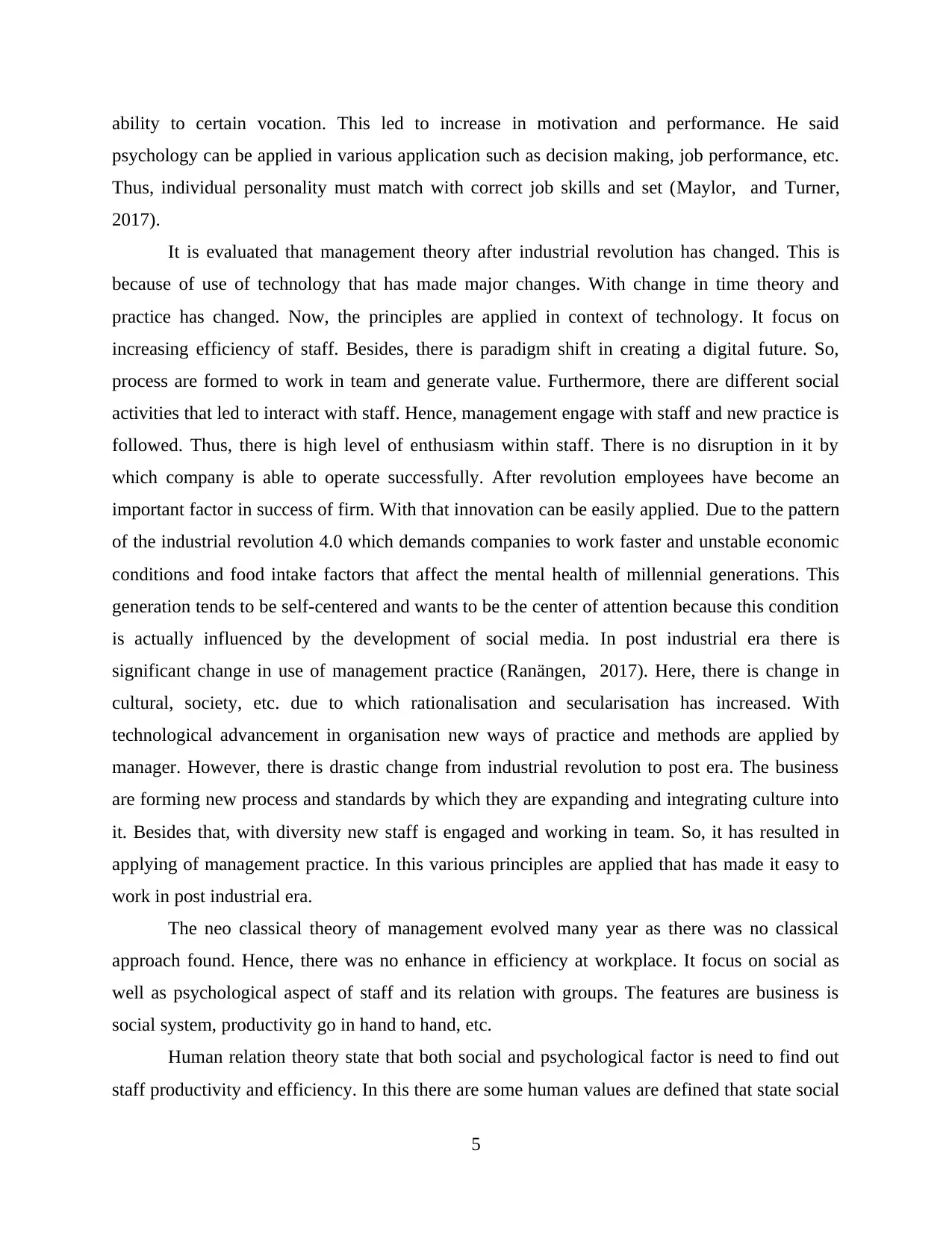
ability to certain vocation. This led to increase in motivation and performance. He said
psychology can be applied in various application such as decision making, job performance, etc.
Thus, individual personality must match with correct job skills and set (Maylor, and Turner,
2017).
It is evaluated that management theory after industrial revolution has changed. This is
because of use of technology that has made major changes. With change in time theory and
practice has changed. Now, the principles are applied in context of technology. It focus on
increasing efficiency of staff. Besides, there is paradigm shift in creating a digital future. So,
process are formed to work in team and generate value. Furthermore, there are different social
activities that led to interact with staff. Hence, management engage with staff and new practice is
followed. Thus, there is high level of enthusiasm within staff. There is no disruption in it by
which company is able to operate successfully. After revolution employees have become an
important factor in success of firm. With that innovation can be easily applied. Due to the pattern
of the industrial revolution 4.0 which demands companies to work faster and unstable economic
conditions and food intake factors that affect the mental health of millennial generations. This
generation tends to be self-centered and wants to be the center of attention because this condition
is actually influenced by the development of social media. In post industrial era there is
significant change in use of management practice (Ranängen, 2017). Here, there is change in
cultural, society, etc. due to which rationalisation and secularisation has increased. With
technological advancement in organisation new ways of practice and methods are applied by
manager. However, there is drastic change from industrial revolution to post era. The business
are forming new process and standards by which they are expanding and integrating culture into
it. Besides that, with diversity new staff is engaged and working in team. So, it has resulted in
applying of management practice. In this various principles are applied that has made it easy to
work in post industrial era.
The neo classical theory of management evolved many year as there was no classical
approach found. Hence, there was no enhance in efficiency at workplace. It focus on social as
well as psychological aspect of staff and its relation with groups. The features are business is
social system, productivity go in hand to hand, etc.
Human relation theory state that both social and psychological factor is need to find out
staff productivity and efficiency. In this there are some human values are defined that state social
5
psychology can be applied in various application such as decision making, job performance, etc.
Thus, individual personality must match with correct job skills and set (Maylor, and Turner,
2017).
It is evaluated that management theory after industrial revolution has changed. This is
because of use of technology that has made major changes. With change in time theory and
practice has changed. Now, the principles are applied in context of technology. It focus on
increasing efficiency of staff. Besides, there is paradigm shift in creating a digital future. So,
process are formed to work in team and generate value. Furthermore, there are different social
activities that led to interact with staff. Hence, management engage with staff and new practice is
followed. Thus, there is high level of enthusiasm within staff. There is no disruption in it by
which company is able to operate successfully. After revolution employees have become an
important factor in success of firm. With that innovation can be easily applied. Due to the pattern
of the industrial revolution 4.0 which demands companies to work faster and unstable economic
conditions and food intake factors that affect the mental health of millennial generations. This
generation tends to be self-centered and wants to be the center of attention because this condition
is actually influenced by the development of social media. In post industrial era there is
significant change in use of management practice (Ranängen, 2017). Here, there is change in
cultural, society, etc. due to which rationalisation and secularisation has increased. With
technological advancement in organisation new ways of practice and methods are applied by
manager. However, there is drastic change from industrial revolution to post era. The business
are forming new process and standards by which they are expanding and integrating culture into
it. Besides that, with diversity new staff is engaged and working in team. So, it has resulted in
applying of management practice. In this various principles are applied that has made it easy to
work in post industrial era.
The neo classical theory of management evolved many year as there was no classical
approach found. Hence, there was no enhance in efficiency at workplace. It focus on social as
well as psychological aspect of staff and its relation with groups. The features are business is
social system, productivity go in hand to hand, etc.
Human relation theory state that both social and psychological factor is need to find out
staff productivity and efficiency. In this there are some human values are defined that state social
5
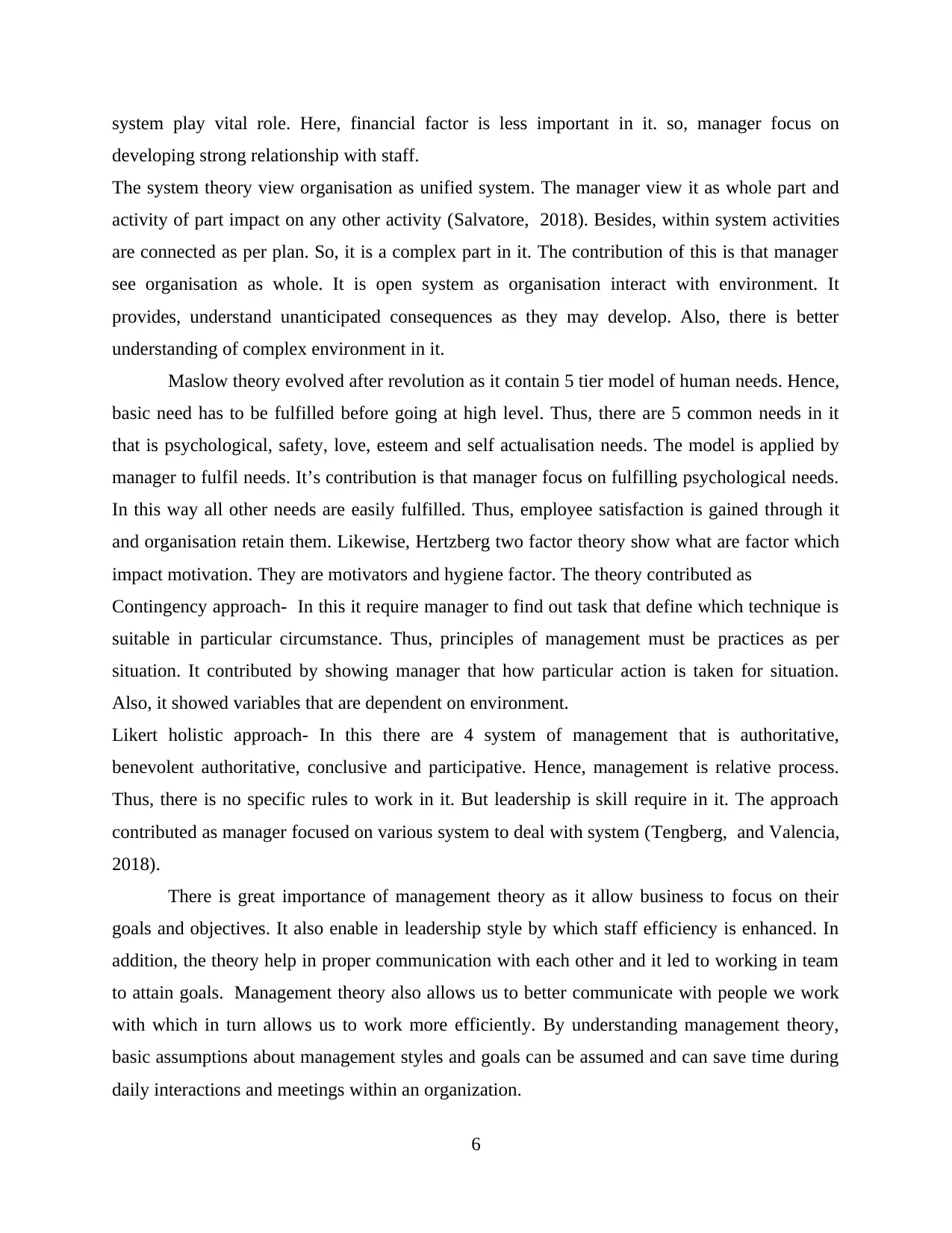
system play vital role. Here, financial factor is less important in it. so, manager focus on
developing strong relationship with staff.
The system theory view organisation as unified system. The manager view it as whole part and
activity of part impact on any other activity (Salvatore, 2018). Besides, within system activities
are connected as per plan. So, it is a complex part in it. The contribution of this is that manager
see organisation as whole. It is open system as organisation interact with environment. It
provides, understand unanticipated consequences as they may develop. Also, there is better
understanding of complex environment in it.
Maslow theory evolved after revolution as it contain 5 tier model of human needs. Hence,
basic need has to be fulfilled before going at high level. Thus, there are 5 common needs in it
that is psychological, safety, love, esteem and self actualisation needs. The model is applied by
manager to fulfil needs. It’s contribution is that manager focus on fulfilling psychological needs.
In this way all other needs are easily fulfilled. Thus, employee satisfaction is gained through it
and organisation retain them. Likewise, Hertzberg two factor theory show what are factor which
impact motivation. They are motivators and hygiene factor. The theory contributed as
Contingency approach- In this it require manager to find out task that define which technique is
suitable in particular circumstance. Thus, principles of management must be practices as per
situation. It contributed by showing manager that how particular action is taken for situation.
Also, it showed variables that are dependent on environment.
Likert holistic approach- In this there are 4 system of management that is authoritative,
benevolent authoritative, conclusive and participative. Hence, management is relative process.
Thus, there is no specific rules to work in it. But leadership is skill require in it. The approach
contributed as manager focused on various system to deal with system (Tengberg, and Valencia,
2018).
There is great importance of management theory as it allow business to focus on their
goals and objectives. It also enable in leadership style by which staff efficiency is enhanced. In
addition, the theory help in proper communication with each other and it led to working in team
to attain goals. Management theory also allows us to better communicate with people we work
with which in turn allows us to work more efficiently. By understanding management theory,
basic assumptions about management styles and goals can be assumed and can save time during
daily interactions and meetings within an organization.
6
developing strong relationship with staff.
The system theory view organisation as unified system. The manager view it as whole part and
activity of part impact on any other activity (Salvatore, 2018). Besides, within system activities
are connected as per plan. So, it is a complex part in it. The contribution of this is that manager
see organisation as whole. It is open system as organisation interact with environment. It
provides, understand unanticipated consequences as they may develop. Also, there is better
understanding of complex environment in it.
Maslow theory evolved after revolution as it contain 5 tier model of human needs. Hence,
basic need has to be fulfilled before going at high level. Thus, there are 5 common needs in it
that is psychological, safety, love, esteem and self actualisation needs. The model is applied by
manager to fulfil needs. It’s contribution is that manager focus on fulfilling psychological needs.
In this way all other needs are easily fulfilled. Thus, employee satisfaction is gained through it
and organisation retain them. Likewise, Hertzberg two factor theory show what are factor which
impact motivation. They are motivators and hygiene factor. The theory contributed as
Contingency approach- In this it require manager to find out task that define which technique is
suitable in particular circumstance. Thus, principles of management must be practices as per
situation. It contributed by showing manager that how particular action is taken for situation.
Also, it showed variables that are dependent on environment.
Likert holistic approach- In this there are 4 system of management that is authoritative,
benevolent authoritative, conclusive and participative. Hence, management is relative process.
Thus, there is no specific rules to work in it. But leadership is skill require in it. The approach
contributed as manager focused on various system to deal with system (Tengberg, and Valencia,
2018).
There is great importance of management theory as it allow business to focus on their
goals and objectives. It also enable in leadership style by which staff efficiency is enhanced. In
addition, the theory help in proper communication with each other and it led to working in team
to attain goals. Management theory also allows us to better communicate with people we work
with which in turn allows us to work more efficiently. By understanding management theory,
basic assumptions about management styles and goals can be assumed and can save time during
daily interactions and meetings within an organization.
6
⊘ This is a preview!⊘
Do you want full access?
Subscribe today to unlock all pages.

Trusted by 1+ million students worldwide
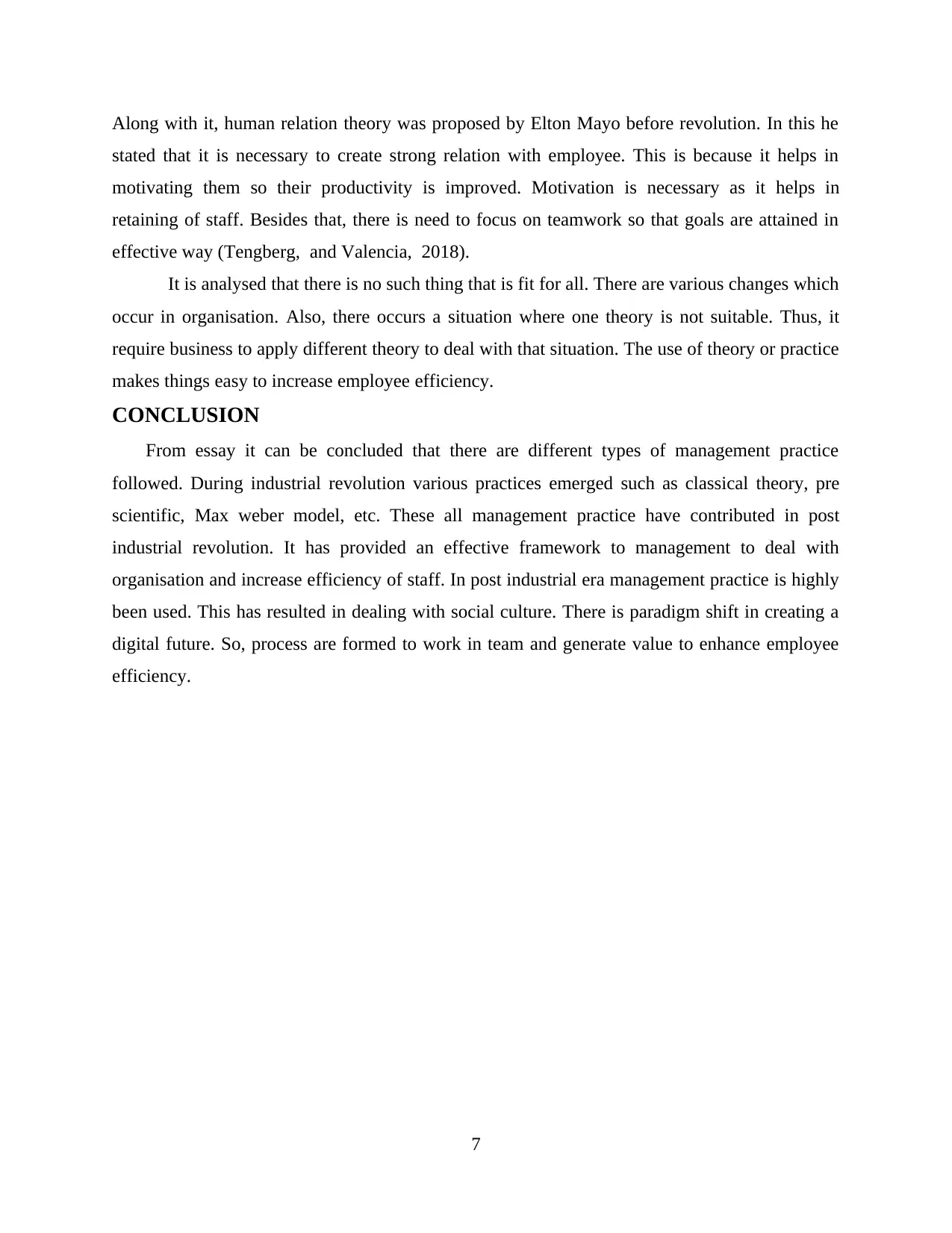
Along with it, human relation theory was proposed by Elton Mayo before revolution. In this he
stated that it is necessary to create strong relation with employee. This is because it helps in
motivating them so their productivity is improved. Motivation is necessary as it helps in
retaining of staff. Besides that, there is need to focus on teamwork so that goals are attained in
effective way (Tengberg, and Valencia, 2018).
It is analysed that there is no such thing that is fit for all. There are various changes which
occur in organisation. Also, there occurs a situation where one theory is not suitable. Thus, it
require business to apply different theory to deal with that situation. The use of theory or practice
makes things easy to increase employee efficiency.
CONCLUSION
From essay it can be concluded that there are different types of management practice
followed. During industrial revolution various practices emerged such as classical theory, pre
scientific, Max weber model, etc. These all management practice have contributed in post
industrial revolution. It has provided an effective framework to management to deal with
organisation and increase efficiency of staff. In post industrial era management practice is highly
been used. This has resulted in dealing with social culture. There is paradigm shift in creating a
digital future. So, process are formed to work in team and generate value to enhance employee
efficiency.
7
stated that it is necessary to create strong relation with employee. This is because it helps in
motivating them so their productivity is improved. Motivation is necessary as it helps in
retaining of staff. Besides that, there is need to focus on teamwork so that goals are attained in
effective way (Tengberg, and Valencia, 2018).
It is analysed that there is no such thing that is fit for all. There are various changes which
occur in organisation. Also, there occurs a situation where one theory is not suitable. Thus, it
require business to apply different theory to deal with that situation. The use of theory or practice
makes things easy to increase employee efficiency.
CONCLUSION
From essay it can be concluded that there are different types of management practice
followed. During industrial revolution various practices emerged such as classical theory, pre
scientific, Max weber model, etc. These all management practice have contributed in post
industrial revolution. It has provided an effective framework to management to deal with
organisation and increase efficiency of staff. In post industrial era management practice is highly
been used. This has resulted in dealing with social culture. There is paradigm shift in creating a
digital future. So, process are formed to work in team and generate value to enhance employee
efficiency.
7
Paraphrase This Document
Need a fresh take? Get an instant paraphrase of this document with our AI Paraphraser
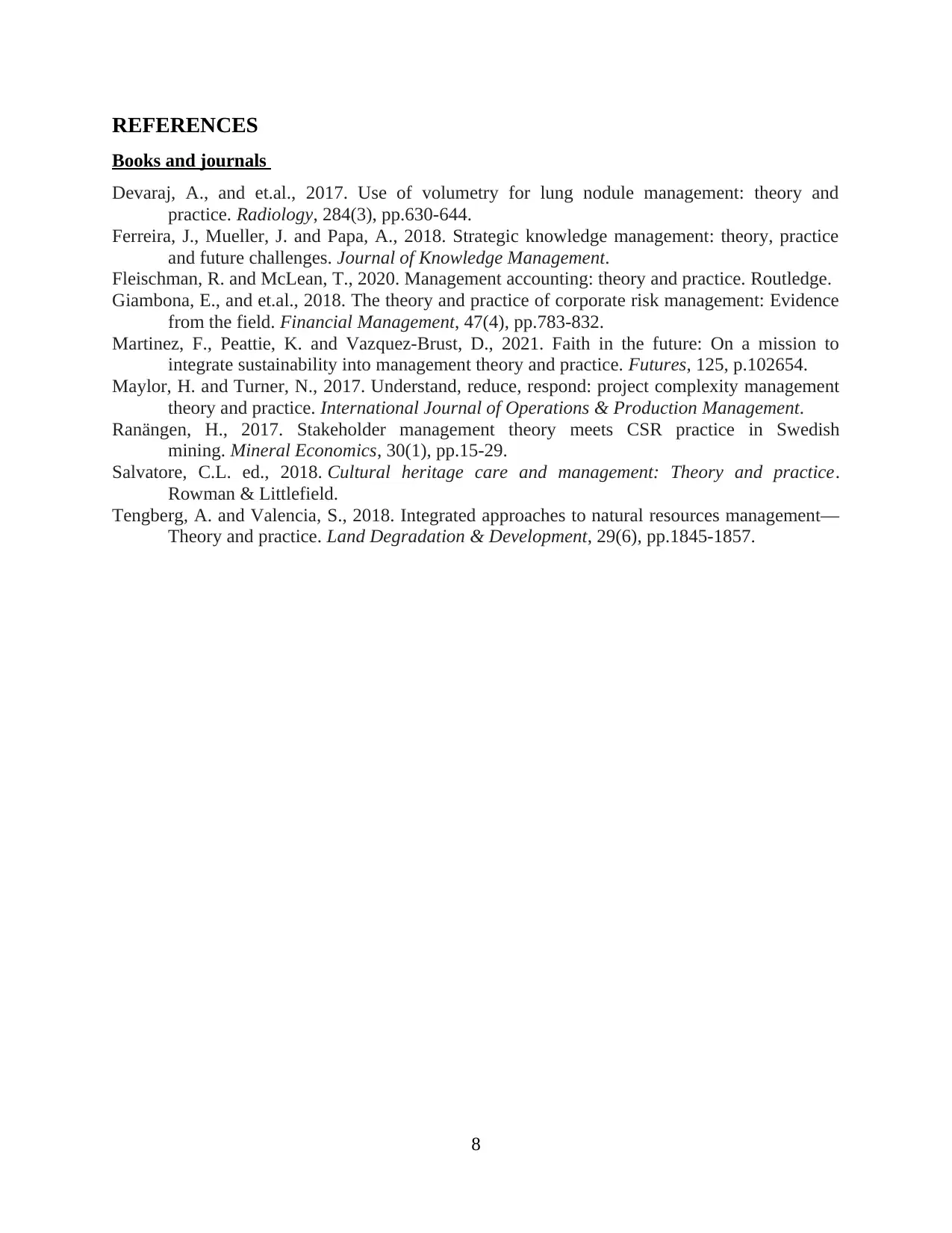
REFERENCES
Books and journals
Devaraj, A., and et.al., 2017. Use of volumetry for lung nodule management: theory and
practice. Radiology, 284(3), pp.630-644.
Ferreira, J., Mueller, J. and Papa, A., 2018. Strategic knowledge management: theory, practice
and future challenges. Journal of Knowledge Management.
Fleischman, R. and McLean, T., 2020. Management accounting: theory and practice. Routledge.
Giambona, E., and et.al., 2018. The theory and practice of corporate risk management: Evidence
from the field. Financial Management, 47(4), pp.783-832.
Martinez, F., Peattie, K. and Vazquez-Brust, D., 2021. Faith in the future: On a mission to
integrate sustainability into management theory and practice. Futures, 125, p.102654.
Maylor, H. and Turner, N., 2017. Understand, reduce, respond: project complexity management
theory and practice. International Journal of Operations & Production Management.
Ranängen, H., 2017. Stakeholder management theory meets CSR practice in Swedish
mining. Mineral Economics, 30(1), pp.15-29.
Salvatore, C.L. ed., 2018. Cultural heritage care and management: Theory and practice.
Rowman & Littlefield.
Tengberg, A. and Valencia, S., 2018. Integrated approaches to natural resources management—
Theory and practice. Land Degradation & Development, 29(6), pp.1845-1857.
8
Books and journals
Devaraj, A., and et.al., 2017. Use of volumetry for lung nodule management: theory and
practice. Radiology, 284(3), pp.630-644.
Ferreira, J., Mueller, J. and Papa, A., 2018. Strategic knowledge management: theory, practice
and future challenges. Journal of Knowledge Management.
Fleischman, R. and McLean, T., 2020. Management accounting: theory and practice. Routledge.
Giambona, E., and et.al., 2018. The theory and practice of corporate risk management: Evidence
from the field. Financial Management, 47(4), pp.783-832.
Martinez, F., Peattie, K. and Vazquez-Brust, D., 2021. Faith in the future: On a mission to
integrate sustainability into management theory and practice. Futures, 125, p.102654.
Maylor, H. and Turner, N., 2017. Understand, reduce, respond: project complexity management
theory and practice. International Journal of Operations & Production Management.
Ranängen, H., 2017. Stakeholder management theory meets CSR practice in Swedish
mining. Mineral Economics, 30(1), pp.15-29.
Salvatore, C.L. ed., 2018. Cultural heritage care and management: Theory and practice.
Rowman & Littlefield.
Tengberg, A. and Valencia, S., 2018. Integrated approaches to natural resources management—
Theory and practice. Land Degradation & Development, 29(6), pp.1845-1857.
8
1 out of 8
Related Documents
Your All-in-One AI-Powered Toolkit for Academic Success.
+13062052269
info@desklib.com
Available 24*7 on WhatsApp / Email
![[object Object]](/_next/static/media/star-bottom.7253800d.svg)
Unlock your academic potential
Copyright © 2020–2025 A2Z Services. All Rights Reserved. Developed and managed by ZUCOL.





